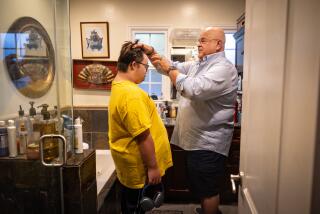High Use Depleted Funds, Former Deaf Center Chief Says
- Share via
Victor H. Galloway, forced last week to resign as director of the National Center on Deafness at Cal State Northridge, said Friday that the financial problems that led to his departure stem from an unexpected increase in enrollment and rising student needs.
In his first public comments since he resigned, Galloway also said he does not blame university President James W. Cleary for pushing him out.
“If I were in the top position, I probably would have taken the same action,” said Galloway, who is deaf and one of the earliest graduates of CSUN’s National Leadership Training Program for educators of the deaf.
Galloway resigned March 6, about two weeks after he told university administrators that the deaf student services center had spent nearly all of its $1.2-million budget four months before the end of the academic year.
Cleary and other campus administrators had looked into complaints that deaf students had no interpreters for 31 classes at the start of the semester. They concluded that Galloway had mismanaged funds.
“In the past, the increase in demand for services was very slight, almost predictable,” Galloway said Friday. “This year, wow, it was really a great increase.”
Now, 227 deaf and hearing-impaired students attend regular CSUN courses with the assistance of the center’s interpreting, note-taking and tutoring services. In the fall, 217 students had enrolled at the university through the center.
In past years, as many as a dozen students dropped out between the fall and spring semesters. Galloway said he had expected that pattern to continue this year.
Also, more of the students enrolled in smaller, upper-division courses, instead of in larger introductory classes where they could be grouped together under one interpreter. And students increasingly asked for interpreters to aid their participation in student government and other non-academic areas.
“We have a different breed of deaf student today. . . . I think it’s wonderful,” said Galloway.
Galloway said deaf students are more aware of their right to participate in all aspects of student life because many have attended regular schools all their lives. He also said news of the 1988 student protests at Gallaudet College in Washington, D.C.--which erupted after the appointment of a president who was not deaf--fueled the activism at CSUN.
In retrospect, Galloway said he should have seen the budget problems coming.
Galloway said he contacted a campus budget expert in January about the possibility of tying center funding to student enrollment, a practice followed at many universities. But he did not discuss the seriousness of the center’s financial situation.
“At that time, I did not realize the extent of the problems,” he said.
The National Center on Deafness, one of four regional programs for mainstreaming deaf college students, moved into a new, $2.7-million brick building a year ago. Galloway said publicity about that move and fund raising for equipment, supplies and new programs distracted him from the day-to-day center operations.
“I probably lost sight of what was happening,” he said. “It creeped up on us.”
Cleary visited the center Thursday to reassure students that the university will pay for interpretation services through the end of the academic year in June. Normally, the center is funded by the state and by an array of federal grants.
Administrators have said little about Galloway’s ouster, pending results of an internal audit of the budget. An extensive program review also is in progress, which is expected to include a recommendation to fold the center into one of the university’s schools, perhaps the School of Education.
“That’s a good idea. . . . I think there will be more checks and balances,” Galloway said. “Sometimes I felt a little bit impotent where I was.”
At first, administrators and students speculated that Galloway might have used center money for more administrative staff members instead of for interpreters. But by mid-week, based on a preliminary review of the center’s finances, administrators had backed away from that assumption.
“It appears that a number of factors came together,” said Bob Suzuki, vice president for academic affairs. “Students were asking for more services, there were more students in the program, and the budget was remaining constant.”
But Suzuki said his major concern was the delay in alerting campus administrators to the budget problems.
“Projections weren’t done,” he said. “If they had been done earlier, we could have been able to more easily make adjustments to the budget.”
More to Read
Sign up for Essential California
The most important California stories and recommendations in your inbox every morning.
You may occasionally receive promotional content from the Los Angeles Times.













